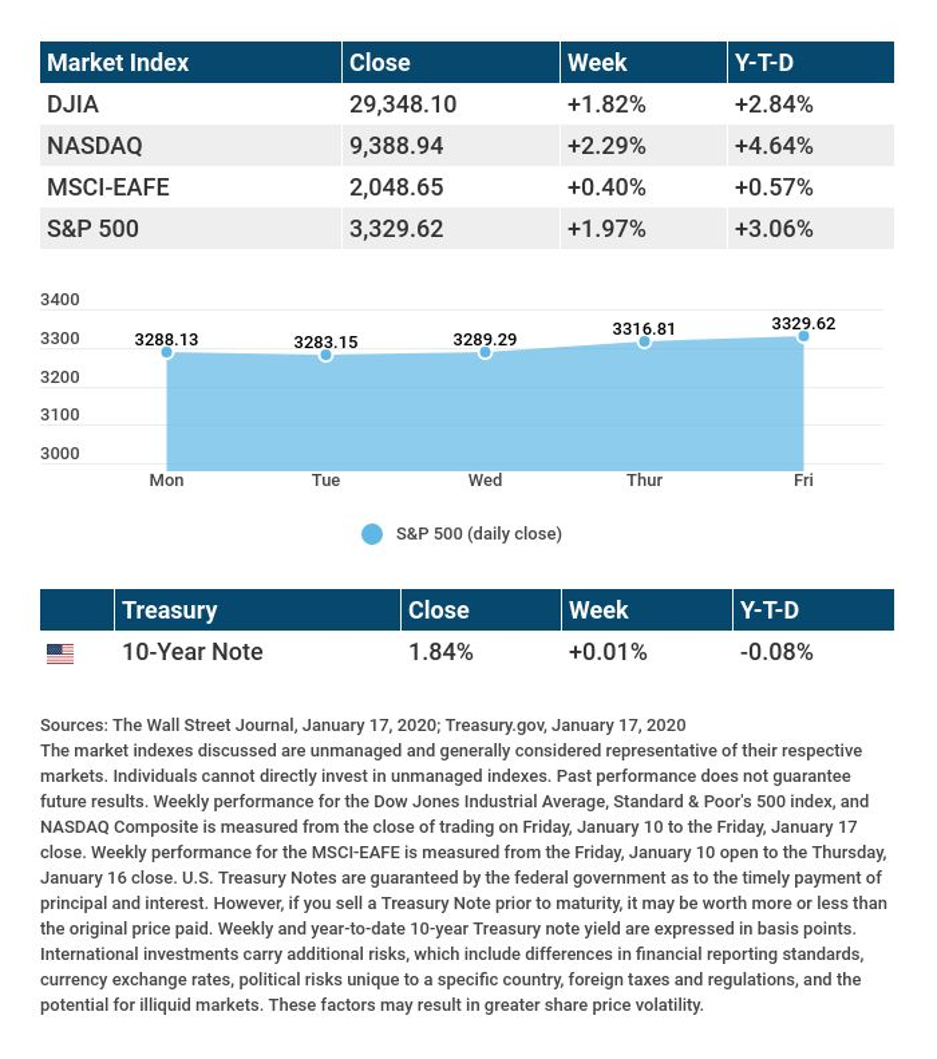The Week on Wall Street
Traders were in an upbeat mood last week, reacting to news out of Washington: the signing of the phase-one trade deal between the U.S. and China as well as the Senate passage of the U.S.-Mexico-Canada Agreement (USMCA). In addition, a new earnings season started. Risk appetite grew and spurred all three of the major Wall Street averages to record settlements on Friday.1
For the week, the Nasdaq Composite rose 2.29%; the S&P 500, 1.97%; the Dow Jones Industrial Average, 1.82%. International stocks improved 0.40%, according to MSCI’s EAFE index.2, 3
Progress on the Trade Front
President Donald Trump and Chinese Vice Premier Liu He signed off on a new, partial U.S.-China trade pact Wednesday. In this deal, China agrees to buy at least $200 billion more of American products, crops, and energy futures over a 2-year period, and it must submit an “action plan” by mid-February, detailing how it will better protect American intellectual property and cut counterfeiting of American goods. The U.S. agrees to halve 15% tariffs on $120 billion of Chinese imports (other tariffs slated for last December were scrapped earlier as part of this agreement).
As for the USMCA, President Trump is expected to sign it into law this week. It was passed 89-10 in the Senate on Thursday and by a wide margin in the House of Representatives in December. Mexico’s government has also approved the USMCA; Canada’s government has yet to do so.4,5
Homebuilding Picks Up
The Census Bureau reported a 16.9% surge in housing starts in December. This surpassed expectations; housing market analysts, surveyed by Refinitiv, had expected no increase.6
What’s Ahead
U.S. stock markets are closed Monday in observance of Martin Luther King Jr. Day. Post offices and Social Security offices will also be closed Monday, as well as most banks.
THE WEEK AHEAD: KEY ECONOMIC DATA
Wednesday: December existing home sales figures from the National Association of Realtors.
Source: MarketWatch, January 17, 2020
The MarketWatch economic calendar lists upcoming U.S. economic data releases (including key economic indicators), Federal Reserve policy meetings, and speaking engagements of Federal Reserve officials. The content is developed from sources believed to be providing accurate information. The forecasts or forward-looking statements are based on assumptions and may not materialize. The forecasts also are subject to revision.
THE WEEK AHEAD: COMPANIES REPORTING EARNINGS
Tuesday: Capital One (COF), Netflix (NLFX), TD Ameritrade (AMTD), United Airlines (UAL)
Wednesday: Abbott Labs (ABT), Johnson & Johnson (JNJ), Texas Instruments (TXN)
Thursday: Comcast (CMCSA), Intel (INTC), Procter & Gamble (PG), Union Pacific (UNP)
Friday: American Express (AXP), Nextera Energy (NEE)
Source: Zacks, January 17, 2020
Companies mentioned are for informational purposes only. It should not be considered a solicitation for the purchase or sale of the securities. Any investment should be consistent with your objectives, time frame and risk tolerance. The return and principal value of investments will fluctuate as market conditions change. When sold, investments may be worth more or less than their original cost. Companies may reschedule when they report earnings without notice.

Investing involves risk including the potential loss of principal. No investment strategy can guarantee a profit or protect against loss in periods of declining values.
Diversification does not guarantee profit nor is it guaranteed to protect assets.
International investing involves special risks such as currency fluctuation and political instability and may not be suitable for all investors.
The Standard & Poor’s 500 (S&P 500) is an unmanaged group of securities considered to be representative of the stock market in general.
The Dow Jones Industrial Average is a price-weighted average of 30 significant stocks traded on the New York Stock Exchange and the NASDAQ. The DJIA was invented by Charles Dow back in 1896.
The Nasdaq Composite is an index of the common stocks and similar securities listed on the NASDAQ stock market and is considered a broad indicator of the performance of stocks of technology companies and growth companies.
The MSCI EAFE Index was created by Morgan Stanley Capital International (MSCI) that serves as a benchmark of the performance in major international equity markets as represented by 21 major MSCI indices from Europe, Australia, and Southeast Asia.
The 10-year Treasury Note represents debt owed by the United States Treasury to the public. Since the U.S. Government is seen as a risk-free borrower, investors use the 10-year Treasury Note as a benchmark for the long-term bond market.
Opinions expressed are subject to change without notice and are not intended as investment advice or to predict future performance.
Past performance does not guarantee future results.
You cannot invest directly in an index.
Consult your financial professional before making any investment decision.
Fixed income investments are subject to various risks including changes in interest rates, credit quality, inflation risk, market valuations, prepayments, corporate events, tax ramifications and other factors.
These are the views of Platinum Advisor Strategies, LLC, and not necessarily those of the named representative, Broker dealer or Investment Advisor and should not be construed as investment advice. Neither the named representative nor the named Broker dealer or Investment Advisor gives tax or legal advice. All information is believed to be from reliable sources; however, we make no representation as to its completeness or accuracy. Please consult your financial advisor for further information.
By clicking on these links, you will leave our server, as the links are located on another server. We have not independently verified the information available through this link. The link is provided to you as a matter of interest. Please click on the links below to leave and proceed to the selected site.

